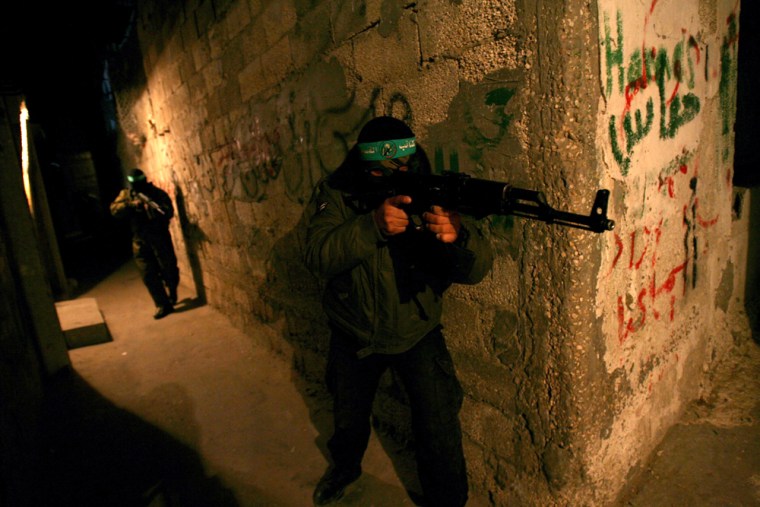Hamas officials in Gaza and Beirut said Thursday the Islamic militant group will not extend a six-month truce with Israel, as the two sides attacked each other.
Hamas says the cease-fire ends Friday, but Israel maintains that the unwritten truce accord does not have an expiration date. Violence has already resumed, though at a lower level than before the truce took effect.
On Thursday, Gaza militants fired 11 rockets and six mortar shells toward Israel. Israel's military launched at least two air strikes against rocket squads.
Speaking in Tel Aviv on Thursday, Israeli Prime Minister Ehud Olmert denounced the Hamas regime in Gaza but did not relate directly to the escalating violence. Instead, he called for continued efforts toward peace agreement with the Palestinians and Syria.
Gaza Hamas spokesman Fawzi Barhoum said "there is no chance of extending the calm," blaming Israel for the breakdown. In Beirut, Hamas official Osama Hamdan told The Associated Press that the truce would end on Friday.
It was not clear if this was Hamas' final word. The group, which rules Gaza, has been issuing contradictory statements about the truce this week.
Chance lull could be restored
Despite the renewed violence, there was a chance that the lull could be restored. Both sides appeared to be jockeying for position, trying to improve the terms of the truce. On the other hand, a single attack by either side that takes significant casualties could spark a larger conflict.
The truce started coming apart in November, when Israeli forces entered Gaza to destroy a tunnel the military said militants were trying to dig under the border. Gaza rocket squads responded by resuming daily barrages at Israel's south.
Though violence and casualties dropped significantly during the truce, neither side was satisfied. Hamas complained that Israel never fully opened its border crossings to let vital cargo in and exports out, while Israel charged that Hamas used the time to replenish its arsenal with arms smuggled in through dozens of tunnels under the Egyptian border.
Speaking at a conference of the Institute for National Security Studies at Tel Aviv University, Olmert called for serious negotiations toward a peace treaty with the Palestinians, though that would require "painful concessions."
Olmert, who leaves office next year, also urged continuation of contacts with Syria. "A peace treaty with Syria can be achieved," he said. Israel and Syria have held several rounds of indirect talks in Turkey in recent months.
The Likud Party leads in polls ahead of Feb. 10 elections, and its leader, Benjamin Netanyahu, has said that he would concentrate on economic cooperation instead of a peace treaty. He has also expressed stiff opposition to trading the Golan Heights for peace with Syria. Israel captured the strategic plateau in the 1967 Mideast war.
Olmert warned, "An Israeli government that does not show flexibility, political initiative and readiness for significant and painful compromises to win peace with the Palestinians and the Syrians is liable to be pushed into a corner, bring on itself harsh international criticism that would be harmful from the security and economic points of view."
